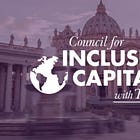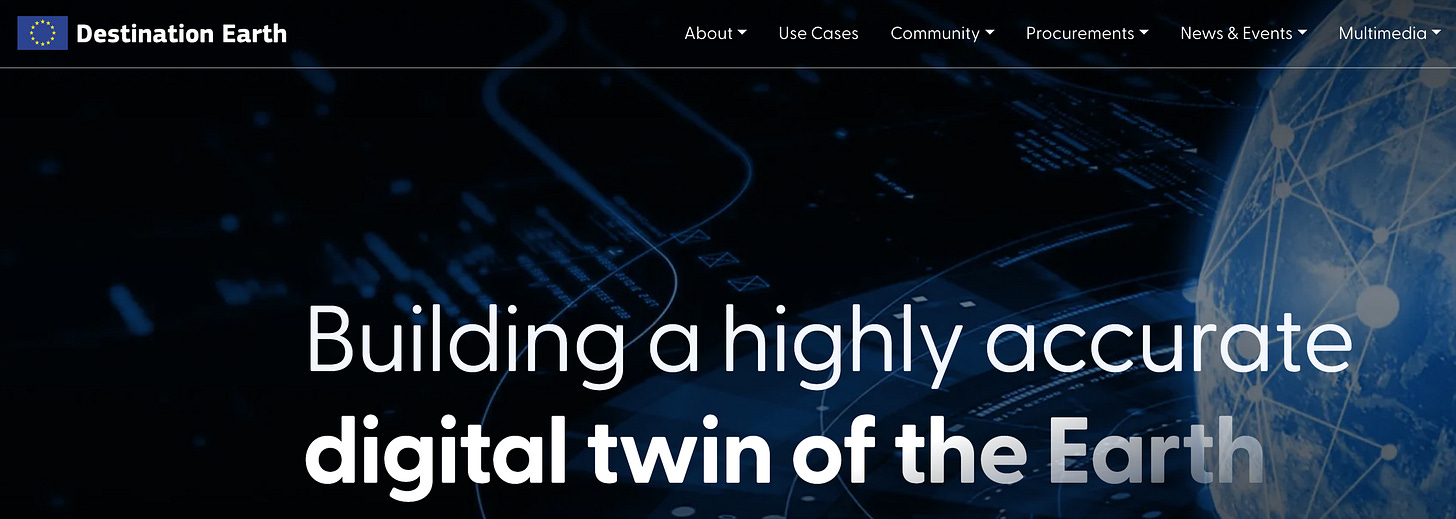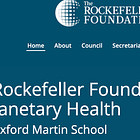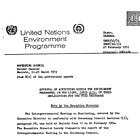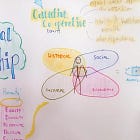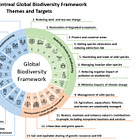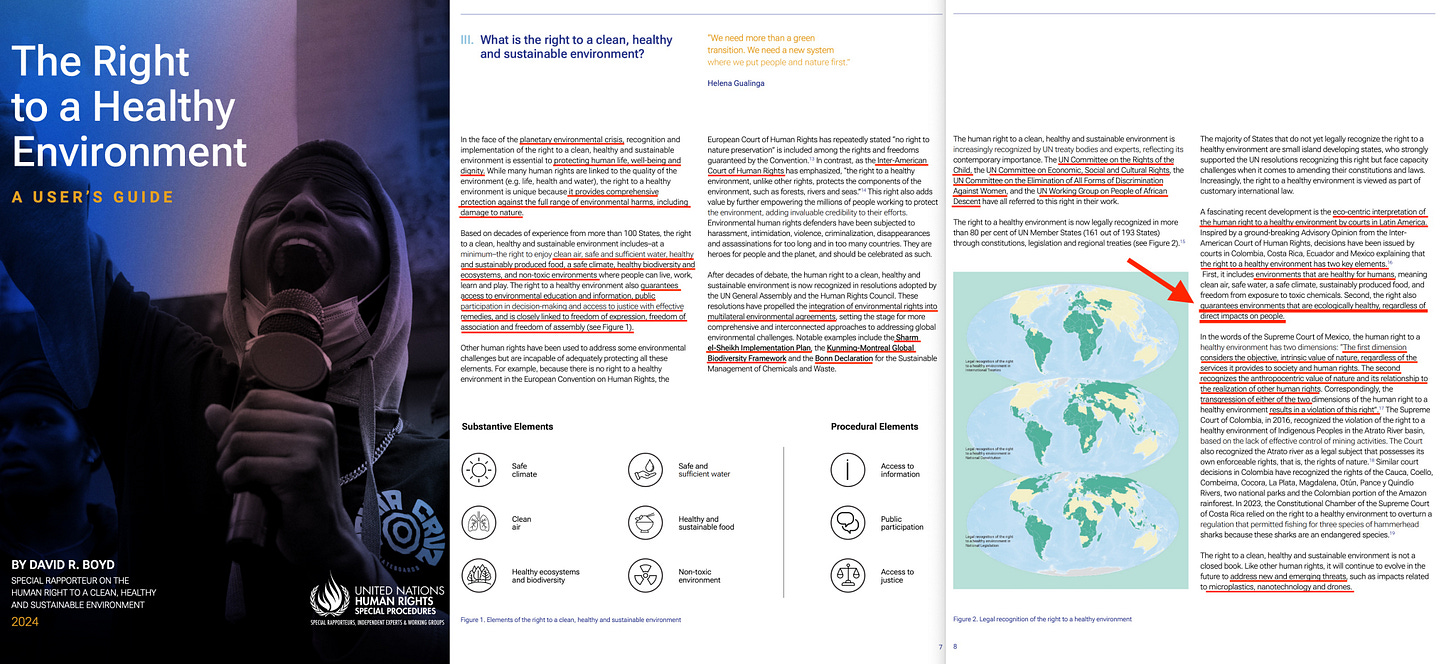The alleged COVID-19 pandemic did not change global governance but rather revealed the presence of an expansive cybernetic architecture, designed years prior for rapid activation and expansion. Latent operational doctrine was fully activated, and the Pandemic Treaty advances this even further, by legally codifying the same planetary-scale, algorithm-driven regime, thus replacing traditional democratic models, justified under claims of emergency intervention for the ‘common good’.
But the next crisis — through the inclusion of One Health — will not merely loop in ecosystem damage as a reason for declaring a pandemic, but also fully integrate the response with the financial system.
As discussed yesterday, the global response to COVID-19 served as a real-time demonstration of integrated cybernetic governance, transforming theory into practice at scale. Policy responses sidelined conventional political deliberation and instead followed compliance with predetermined models, such as those simulated during the Event 201 and SPARS exercises, which set the standards for harmonisation across nation states. Technologies and systems previously considered peripheral — ranging from digital identity and mobile tracking to new censorship infrastructures and central bank crisis tools — were swiftly mobilised to support and enforce pandemic management protocols.
In parallel, the Treaty1 calls for the centralised control of global supply chains during declared health emergencies. Under the pretext of ensuring equitable access to vaccines, diagnostics, and personal protective equipment, national sovereignty over procurement and distribution is subordinated to supranational coordination mechanisms. The WHO, alongside industry consortia and global financing entities, gains real-time oversight over production, inventory, and logistics pipelines — enabling algorithmic triage of who receives what, when, and how. Supply chain simulation models determine allocation, with local conditions overridden by global equity algorithms. This system, once activated, becomes not merely a logistical apparatus but a moral one — making the very act of national prioritisation a potential ethical violation.
Though promised as more temporary in nature, interventions such as lockdowns and quarantines transitioned into ongoing expectations of moral duty, with compliance itself reinterpreted as a marker of public virtue. Behavioural science was repurposed from persuasion to prescriptive programming of population behaviour, fused into every aspect of culture, thereby reorienting previously democratic societies towards models reliant on primarily algorithmic computation.
But the Pandemic Treaty’s inclusion of the One Health framework expands public health beyond infectious disease control to encompass ecological and animal health, thereby transforming biosecurity into a comprehensive system. In this environment, legitimacy ultimately comes down to the cybernetic outputs of black box models, with the democratic process relegated to mere theatre, and little else.
By codifying the One Health framework as an organisational principle for global governance, the Pandemic Treaty blurs the boundaries between medicine, ecology, and economics. Human, animal, and environmental health are integrated into a single operational logic, transforming ethics into a programmable constraint — executed automatically through algorithms, protocols, and feedback systems. As a concept, this is not easily grasped — but within this system, the weaponisation of ‘ethics’ is pivotal.
And Planetary Health extends this logic by operationalising climate change, biodiversity loss, and ecosystem breakdown as emergencies to be managed through continuous environmental surveillance — transforming them into a global ethical imperative (because you don’t want those cuddly pandas to die, now do you). Traditional democratic processes give way to metrics: carbon emissions, water usage, species decline — with planetary boundary thresholds, defined by simulation models, directly triggering interventions such as travel restrictions, rationing, and economic penalties, targeted with maximum precision down to the individual. These measures entirely bypass political debate, yet are justified through crisis framing, presented as necessary for preserving the stability of the system’s feedback architecture.
Never mind that the ‘indicators’ are rotten, that the Digital Twin models cannot be challenged, and that those who designed the system knew it could never predict what was claimed. Still, they carried on with its implementation — because it was never about protecting the planet in the first place. Moiseev, for one, proves this — but the entire lead-up to the May 23, 1972 agreement exposes the progression as nothing short of engineered fraud (read ‘the missing link’ below).
The net result is the creation of a future model of global governance that shifts political policy orientation toward computational modelling — with ‘ethics’ becoming the central pillar of calculation, framing any public measure under claims of serving the ‘common good’ — but this time, with global modellers treating humanity as merely another species to be managed within the global ecosystem2, no doubt to be culled if their impact on the planet exceeds dubious planetary boundary thresholds which cannot be legitimately challenged.
At the centre of this regime is the construction of algorithmic stand-ins for ethical reasoning — progressively encoded into standards frameworks, artificial intelligence protocols, and the indicators and metrics that underpin Sustainable Development Goals (SDG indicators), biodiversity targets (Aichi indicators), and social equity benchmarks (HDI indicators). Individuals are assigned scores — derived from carbon footprints, immunisation status, recorded digital speech, and tracked social behaviours — which subsequently dictate access to key spheres of activity: mobility, financial services, public resources. Truth, virtue, and ethical standing become matters of calculation — with computational outputs gradually replacing human judgement.
The philosophical engine of this system aligns wholesale with Cybernetic Thomism, which holds that ‘ethics’ is defined by the imperative of Planetary Health, guided by adaptive management and ultimately outsourced to advanced AI. This is coupled with Cybernetic Empiriomonism, which encodes these computed ‘ethics’ through cultural engineering, drawing on pre-existing frameworks, such as Tabara’s Sustainability Culture. Ethics, thus, are no longer derived from religious tradition or political debate, but are computational in nature — continually recalibrated by system feedback to maintain order and stability, though not exactly the kind of order you’re used to.
In this new architecture, enforcement through the ‘moral economy’ becomes intimately integrated with finance, transforming central banks into custodians of moral conformity, while fiscal policy itself is gradually shifted beyond democratic oversight. Through BIS-led collaborative projects such as mBridge, Helvetia, Genesis, and Nexus, the infrastructure for programmable money is already in place. First, the Fabian Society’s In Tandem called for granting central banks ‘influence’ over fiscal policy — and now, even the BIS has quietly begun echoing the same message, as recently as days ago3.
And though it is claimed that future CBDCs are not programmable, programmability can be easily implemented through custom wallet technology — maintaining technical compliance with the law while still enabling the policing of individual transactions. In practice, this mirrors the very Social Credit Systems they claim to have outlawed — which should make clear just how much trust these actors deserve.
The outcome is Inclusive Capitalism — a regime that overlays morality onto finance, making central banks responsible for enforcing collective ethical standards through direct programmatic controls, measuring adherence to policy justified by continuous, unchallengeable claims of planetary meta-crises.
Within the framework of the Pandemic Treaty, sovereignty migrates from nation-states and elected leadership to those institutions that define the indicator data, select and validate the operative black box models, and set the action triggers for global systems. International bodies such as WHO, ISO, BIS, and UNEP won’t legislate in the traditional sense, but configure protocols and set standards which are implemented by national governments without a shred of democratic debate. Policy becomes global surveillance data-driven, interpreted from simulation outputs, with the legal code itself progressively replaced by the output of a Digital Twin.
In this context, it becomes clear that simulation exercises like Event 201 and SPARS did not merely model possible futures — they functioned as trial runs for practical conditioning regimes, acclimatising politicians to treat adaptive management and computationally modelled outputs as commands, with legislation inching ever closer to cybernetic control protocols — again, without a shred of democratic oversight.
As briefly touched upon above, the cybernetic loop refined during the alleged recent public health emergency is migrating into the wider domains of climate and ecological policy, with current and emerging mechanisms including:
Mobility restrictions tethered to climate emergency designations and monitored via digital identity systems.
Carbon credit markets integrated with digital identity and programmable money, allowing for precise monitoring and enforcement of ecological quotas.
The rationing of foundational resources such as water, protein sources, and travel permissions through digital twin models and urban-scale simulations.
Platform-driven content moderation justified as disinformation containment in the name of public health or ecological stewardship.
And these interventions will progressively crystallise as infrastructural norms through concepts such as the 15-minute city4, smart grids5 for real-time energy and resource monitoring, and the deployment of planetary-scale computational platforms for environmental surveillance and management, such as DestinE6. These infrastructures are not conveniences, but protocols for embedding continuous control into the Total Human Ecosystem, justified under claimed ‘planetary ethics’, ie, the Earth Charter.
In this light, the conclusion becomes inescapable:
COVID-19 marked not merely a shift in public health management, but the launch of a cybernetic governance architecture now advancing toward totalisation. The Pandemic Treaty cements its operational blueprint, further incorporating ecosystem disturbance as a justification for declaring future crises, while the paradigm of Planetary Health offers a pretext for expanding control through flawed claims of atmospheric pollution. Within this system, the component architectures will progressively merge.
Cybernetic Thomism will drive policy through automated algorithmic calculation and execution.
Cybernetic Empiriomonism will orchestrate computer-driven cultural engineering, increasingly mapping onto the individual through AI and brain-computer interfaces — ultimately fulfilling Yuval Harari’s prediction that elections will become obsolete. ‘Ethics,’ encoded across every layer of society — including AI and BCI systems — will be algorithmically tailored to deliver messaging so manipulatively precise that consent becomes redundant.
Universal Moral Grammar will formalise the expansion of traditional, religious morality into a vast dataset — realistically computable only by machines — where the appeals process is effectively eliminated, and where every past transgression, even those committed by your forefathers, will algorithmically diminish the future prospects of your children.
Inclusive Capitalism serves as the primary channel for enforcing this conformity, aligning economic access with ever-shifting, system-defined parameters — all under the pretence of morality and virtue, and embedded within the very Social Credit System politicians falsely claimed to have outlawed.
Through this dystopian vision of tomorrow, governance shifts from law to operational protocol, where ethics, economics, and ecology are fused into a moral-computational Digital Twin operating system — one that neither will nor can tolerate meaningful nonconformity. The only outcome that ultimately matters is one’s score within the system, and no domain lies beyond its reach.
And none of this is speculation — current policy trajectories and academic research are aligning squarely with this nightmare, all under the pretence of serving the common good. The future of global governance will function as follows:
Backed by ‘Inclusive Capitalism’ and a ‘moral economy,’ the ultimate telos of planetary governance is currently expressed through the Sustainable Development Goals. However, these (subject to change) goals merely set the premise; to become operationally useful, they must be coupled with global surveillance and measured against a predefined set of reference values.
This, in turn, creates an imperative to act — a transgression related to a specific SDG is no longer just a policy issue but becomes a matter of good versus evil, and therefore, an ethical mandate when a simple computational dot product goes negative.
Meanwhile, GEO BON7 (Global Biodiversity Observation Network) detects an infraction in Bolivia: a local tribe has cut down trees without official approval.
The incident is encoded into the region’s Aichi Biodiversity Indicators8, triggering a cascade of automated policy responses.
Using these indicators, the Digital Twin model projects that, at the current rate, half of Bolivia’s forest cover will be lost by 2184. Immediate intervention is deemed necessary.
The Bolivian government is notified but refuses to intervene, citing the tribe’s extreme poverty — itself a consequence of the global elimination of pesticides9 and fertilisers for the common good.
The impact of the transgression is deemed internationally unacceptable, as the Global Environment Facility had already facilitated multiple ‘biodiversity conservation’ blended finance deals, monetising carbon emission permits tied to the very forests in question.
The General Assembly of the Convention on Biological Diversity consequently objects to this unapproved act of sovereignty, invoking the imperative of planetary health.
Given the heightened stakes, global financial institutions swiftly demand a policy reversal. Should Bolivia fail to comply, its access to international credit markets — now fully mediated through CBDCs — will be suspended.
Bolivian leaders, coincidentally attending a three-week training programme in Mauritius organised by the Bank for International Settlements, reconsider. They invoke UNHCR clauses relating to the ‘Right to a Healthy Environment’10, which assert that these rights are enshrined regardless of direct impacts on people.
These clauses, when processed through a Digital Twin system designed for precisely this function, deliver a binding verdict: evict the tribe in order to protect planetary health11.
The tribe refuses, triggering UNDRR provisions that permit the forcible relocation of populations for their own protection1213 — in this case, justified entirely by the imperative of safeguarding planetary health.
Meanwhile, the incident will not be broadcast globally, as UNESCO regulations deem it outside the scope of the 'Right to Information That You Need' — a boundary condition that legally exempts disclosure14.
In fact, even discussing the event on social media is considered unethical, thus calling for algorithmic censorship for the common good — especially since, per Paul Carus, it fails to align with truth in its relation to the eternal15.
And all of this will be entirely undemocratic, justified by the same type of declared emergency that enabled the rise of the authoritarian National Socialists in Germany in 1933 — a regime that, even in its early days, recognised the strategic importance of legally codifying ethics in the name of the so-called common good.
Only this time, the intended codification of ethics will occur on a global scale16.
Keep reading with a 7-day free trial
Subscribe to The price of freedom is eternal vigilance. to keep reading this post and get 7 days of free access to the full post archives.






![WHO Pandemic Agreement [April, 2024]](https://substackcdn.com/image/fetch/$s_!HHbL!,w_140,h_140,c_fill,f_auto,q_auto:good,fl_progressive:steep,g_auto/https%3A%2F%2Fsubstack-post-media.s3.amazonaws.com%2Fpublic%2Fimages%2Fb69c8066-0498-4924-af63-1344abb2ec85_1206x612.png)










